'Black Day': Foreign diplomats denounce India's brutalities in occupied Kashmir
Saudi, OIC representatives censure India for rights violation in occupied Kashmir
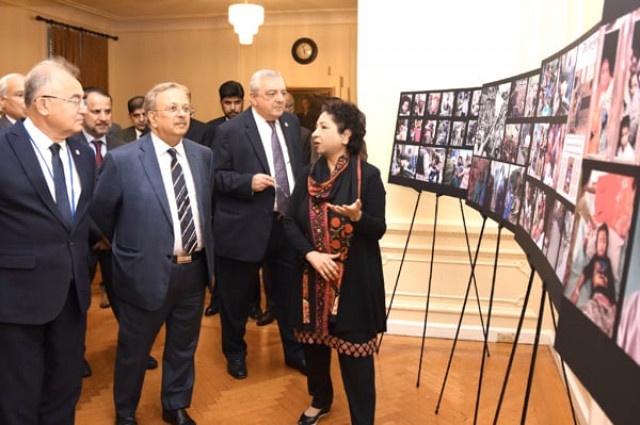
PHOTO: APP
The day is being observed as a 'Black Day' in Pakistan and Kashmir, and the event was organised by outgoing Pakistani ambassador Maleeha Lodhi.
It was the first time that foreign diplomats joined a 'Black Day' event to voice solidarity with the people of Indian Occupied Kashmir (IOK).
Agshin Mehdiyev, the OIC's permanent representative to UN, recalled the steps taken by the 57-member organisation in support of the Kashmiri people and urged the international community to help them 'decisively' in achieving their legitimate rights.
He also drew attention to the joint communique adopted by OIC’s Contact Group on Kashmir last month that called on India to rescind its a decision to strip the occupied territory's special status, withdraw the inhumane curfew and other restrictions, and free thousands of detained people, especially young boys, and local political leaders.
Ambassador Mehdiyev underscored the need for a peaceful resolution of the Kashmir dispute through the democratic method of a free and impartial plebiscite, in accordance with relevant UN Security Council resolutions and aspirations of Kashmiris.
Professor Akmal Saidov, the chairperson of the OIC Independent Permanent Human Rights Commission (IPHRC), focused on the worsening rights situation in occupied Kashmir.
He said India’s August 5 move to abrogate articles 35-A and 370 was “purely aimed at changing the demographic of the State of Jammu and Kashmir by making the indigenous Muslim population a minority within their homeland.”
"Over 8 million Muslims in IOK are under an inhuman curfew that has turned the entire valley into the biggest open prison of the world with severe human rights and humanitarian consequences,” he said, citing mass arrests of people, political leaders, and journalists.
“These blatant human rights violations have reached a scale that a recent BBC report cites Kashmiris preferring death as a better option than the inhumane and excruciating torture and molestation by Indian security forces,” Professor Saidov said.
President Alvi lauds Azerbaijan’s support for Kashmir stance
“Continuation of these mass and grave human rights violations by Indian security forces with impunity under an exclusionary ideology of Hindutva has also led to the issuance of genocide alerts by reputable international human rights organisations,” he told the gathering.
“The world cannot afford to be a bystander in this situation; the suffering of Kashmiris is a burden on the collective conscience of humanity.”
Saudi Arabia's Permanent Representative to the UN Abdallah Al-Mouallimi reaffirmed his country’s unequivocal support for Kashmir and Pakistan. “The Kingdom of Saudi Arabia has always stood by Pakistan on Kashmir and we have always advocated self-determination for the Kashmiri people, as the Saudi people unanimously support their cause,” he said.
The Saudi envoy said the struggle of the people of Kashmir will bear fruit as "the reality is that you cannot suppress a population of 8 million."
"We hope for a peaceful resolution of Kashmir in accordance with UNSC resolutions ... the key to success is an approach that protects the interests of Pakistan, Kashmir, and India," he said.
At our photo exhibition to mark #BlackDay against Indian occupation of Jammu and Kashmir pic.twitter.com/0vOx8Xnp2Y
— Maleeha Lodhi (@LodhiMaleeha) October 27, 2019
Ghulam Nabi Fai, the secretary-general of the Washington-based World Kashmir Awareness, lamented that Kashmir was no longer the paradise it used to be as the Indian government was adamant on turning it into a killing field.
Quoting eminent Indian author Arundhati Roy, he said that democracy in India was long dead and that occupied Kashmir had become one of the most militarised zones in the world.
He also cited Gautam Navlakha, an Indian human rights activist, who repeatedly called the Kashmir struggle an indigenous movement and that India should stop blaming Pakistan.
In the same vain, Fai said Yashwant Sinha, an ex-BJP foreign minister, had acknowledged that India was not losing Kashmir but had already lost it.
Fai urged the international community to uphold its promise to the people of Kashmir by granting them their right of self-determination as enshrined in the UN Security Council resolutions.
Ambassador Lodhi said that although October 27 was observed as a 'Black Day', each day of the occupation was equally dark for the people of IOK.
Rejecting the cynicism and false impression created by some elements that Kashmir was not a priority issue for the Muslim Ummah, the Pakistani envoy welcomed the strong statements made by the Saudi Arabian ambassador as well as by OIC’s permanent representative and the chairman of the OIC’s IPHRC.
She underscored that her Permanent Mission in New York was not just the voice of Pakistan but was also the voice of the oppressed people of Jammu and Kashmir.
Speaking at our event to mark #BlackDay Saudi Arabia’s Amb Abdallah Al-Mouallimi reaffirmed his country's unequivocal support for Kashmir & Pakistan.”We have always stood by Pakistan on Kashmir & advocated self-determination for the Kashmiri people “ pic.twitter.com/vHfbZopcEV
— Maleeha Lodhi (@LodhiMaleeha) October 27, 2019
Ambassador Lodhi said India could not continue its draconian tactics in Kashmir as harsher restrictions would be met with equally strong resistance by the people.
She thanked Turkish President Recep Tayyip Erdogan for his strong statement on Kashmir at the UN and also urged other leaders from the Muslim world to speak out for the rights of the Kashmiri people.
On the sidelines of the event, a photo exhibition was also organised depicting the human rights violations in IOK and highlighting the Kashmiri struggle for inalienable rights.
Also on display were several historic photographs including the first meeting of UN Security Council on Kashmir in 1948 and of UN Observers’ deployment in 1949, as well as the recent consultations in UNSC on August 16, 2019, after a gap of 53 years.

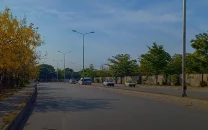
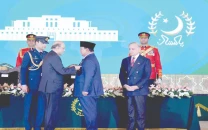
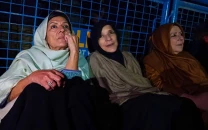
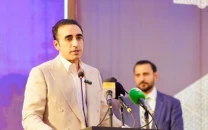

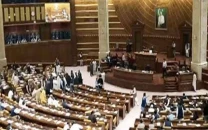












COMMENTS
Comments are moderated and generally will be posted if they are on-topic and not abusive.
For more information, please see our Comments FAQ